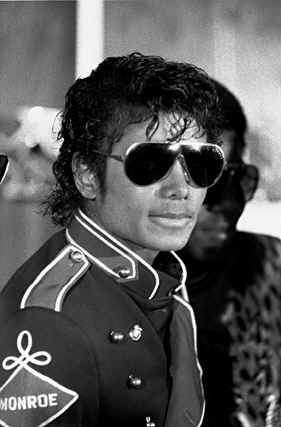Editor’s Note: I’ve always thought that many people in the creative fields — Picasso, Elvis, Spike Lee, Jim Morrison, the list goes on and on — would be better off remembered for whatever they left behind (songs, paintings, movies, etc.), rather than what they were as people. Michael Jackson, who died on June 25, 2009, is a prime example.
The Man in the Mirror
This
place could be much brighter than tomorrow,
And if you really try, you’ll find there’s no need to cry,
In this place you’ll feel there’s no hurt or sorrow.
— Heal the World
There’s something odd about mourning the death of someone you’ve never met and really don’t know. Yet, when it’s a major celebrity, from John Lennon to Princess Di, we Americans regularly do just that.
Maybe it’s because, when people are in the public eye long enough, we feel we know them a little, or at least we feel we know a little something about them. So it is with Michael Jackson, one of the most famous — and surely one of the most bizarre — celebrities of the past 40 years.
|
There’s a certain irony to the fact that Jackson died in the same year our first black president took office. Barack Obama seems as comfortable in his skin as Michael seemed uncomfortable in his. Was there ever a celebrity who tried harder to escape who and what he was? Where Obama represents the dawning of new era in America’s painful racial journey, Michael was like a sad remnant of the old. None of us can know the inner demons from his childhood (or his lack of a childhood) that conspired to create the disturbed and disturbing man-child he became. However, it couldn’t have helped to have come of age in a country so ambivalent about the superficial racial issues he later worked so hard at blanching from his persona. I can’t imagine how bewildering it would be to grow up black in a society where dark skin is so looked down upon that black people would lighten theirs, while white people risk melanoma at the beach trying to tan theirs. At the same time, black people have their hair processed straight, while white women spend hours in beauty salons having their hair tightly curled. And even in this new century, it’s still possible for a pig like shock-jock Don Imus to hurt black college girls by calling them “nappy-headed ho’s.” |
 |
Underneath a hairdo that often looked like it belonged on a Chinese woman, Michael’s cosmetically bleached face was testimony to a damaged self-image. And his arrest papers from Santa Barbara County, which listed him at an anorectic 5 foot 11 and 120 pounds, indicated problems with his body image that didn’t stop at the neck.
As for his criminal prosecution, most of us will never know for sure what, if anything, he was guilty of. But anyone who saw the TV interviews he gave about his activities with children would have to concede that, as in so many other areas of his life, he was his own worst enemy.
Jackson’s awkwardness with fame caused embarrassingly inappropriate behavior, like climbing on top of a van to wave to fans at an arraignment, as if he were a conquering hero. And he always seemed ill at ease with adulthood, like a dysfunctional Peter Pan.
As a paunchy white guy who can’t sing or dance, and is, unfortunately, still wearing the face I was born with, I can’t even begin to understand what would drive a person with so many gifts, and all that money, to sabotage his own life. It’s better we remember him for the music, which were the green shoots of hope and joy that grew from a sad and self-damaged life.
The legacies of talented entertainers, from Janis Joplin to Jimi Hendrix, are usually best recalled through what they produced, rather than what they were as people. In this, he most resembles his deceased erstwhile father-in-law, Elvis, whose own life became a caricature that mocked his talent after his death.
 |
In the days and weeks ahead, we’ll hear about drug abuse, pedophilia, and the meaning of his life and death. I have no idea what his biography means; I’d rather remember the Motown 25th Anniversary performance in 1984, when Michael sang “Billie Jean,” moonwalked across the stage and thrilled millions. On that night, he looked comfortable in his own skin, as he always did when he was singing and dancing. Sadly, that was half his lifetime ago, before the next 25 years mutated into a story best allowed to fade away. |
There are probably lessons to glean from Jackson’s tragic life, but it’s doubtful anyone will learn much from them. A few years from now, people will be mourning another damaged and self-destroyed celebrity — interpreting yet another life story that we’ll never really understand.
As is almost always the case, Shakespeare said it best: “It is a tale told by an idiot, full of sound and fury, signifying nothing.” Happily, the echoes of the music remain.
Click here to return to the Mark Drought home page.